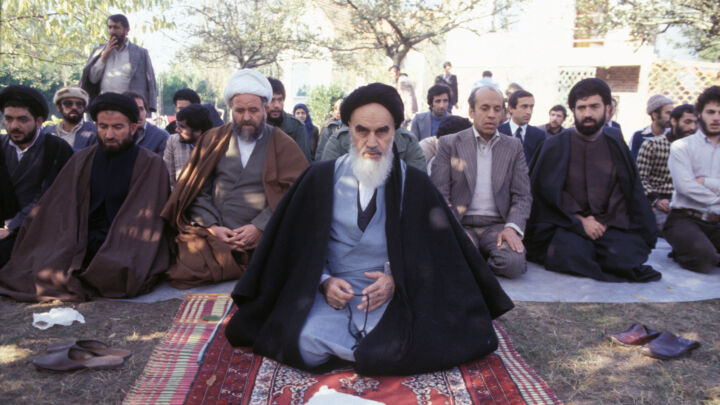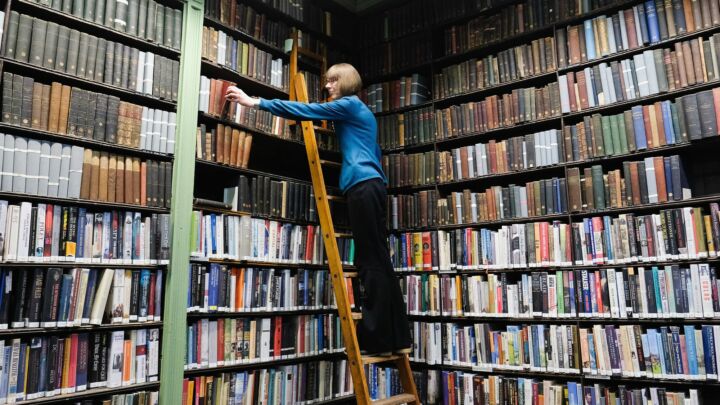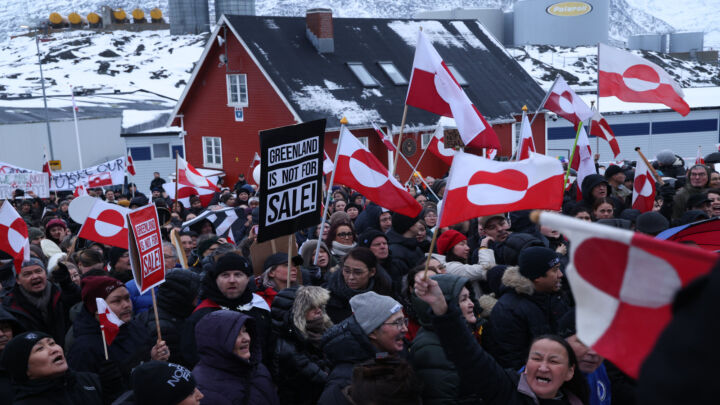The truth about the hatred for Israel
On the ugliness of anti-Israel activism, 50 years since the Six-Day War.

Want unlimited, ad-free access? Become a spiked supporter.
Fifty years ago this week, the Arab world was suffering from severe trauma. In early June 1967, the tiny state of Israel had militarily crushed the surrounding armies of Egypt, Jordan and Syria in just six days of war. That was despite the loudly proclaimed pretensions of the Arab regimes, and Egypt in particular, to represent the Arab masses, anti-imperialism and Third World solidarity.
To understand why Israel’s victory in what came to be know as the Six-Day War was such a shock, it is important to put it into perspective. One way to do this is simply to look at a map of the region as it was. It shows a small state of Israel dwarfed by its much larger neighbours. Not only that, but Israel’s borders, relative to its size, were long and hard to defend. At its narrowest point, the distance between Israel’s border with the West Bank (then part of Jordan) and the Mediterranean Sea was only 9.3 miles (15km). That is just a few minutes’ drive.
Israel was much smaller than the surrounding states by other measures, too. For example, its population in 1967 was about 2.7million compared with 32.4million in Egypt, 5.8million in Syria and 1.3million in Jordan. In economic terms, Israel’s GDP was $1.4 billion compared with $5.6 billion for Egypt, $1.6 billion for Syria and $631million for Jordan. If the numerous other Arab regimes are included – which there is a case for, as many professed support for pan-Arabism – the discrepancy with Israel was even greater.
Some argue that such comparisons understate Israel’s strength. For example, the quality of Israel’s army was better than those of the Arab countries. But such debates need not detain us here. The important point is that in 1967, the Arab regimes were loudly declaring their pan-Arabist credentials while making military threats against Israel. Egypt, for instance, began massing its troops in the Sinai Peninsula along Israel’s border. It also blockaded the strategic straits of Tiran, adjoining the Red Sea, to Israeli shipping.
And yet in the event, the Arab regimes were humiliated by Israel. The Israeli army launched a pre-emptive airstrike which destroyed most of the Egyptian airforce on the ground. When Israel was then attacked by Jordanian and Syrian forces (and some Iraqi forces, too), it struck back against them all.
In less than a week, Israel won a spectacular victory against these combined armies. It took control of the West Bank, including East Jerusalem, as well as the Gaza Strip. The pre-1967 borders are often referred to as the ‘green line’ between Israel as it was and the Palestinian areas that it captured. Israel also captured the Golan Heights from Syria and the Sinai Peninsula from Egypt. Sinai was later handed back in stages following the 1979 peace treaty with Egypt, the largest Arab state.
The war today
The main contemporary relevance of these events of 1967 is that they are seen as the starting point of what is now widely referred to as Israeli ‘apartheid’. Today, there are about 2.7million Palestinians in the West Bank and another 1.9million or so in the Gaza Strip. That is against an Israeli population of about 8.7million, of whom about 1.8million are Palestinian (but who hold Israeli citizenship). In all, there are about 6.5million Israeli Jews and about the same number of Palestinians living in broadly the same area of land.
Although the borders of the West Bank and the Gaza Strip are controlled by Israel, their Palestinian populations have a degree of autonomy. Israel unilaterally withdrew its forces and settlements from Gaza in 2005, and since 2006 the Islamic Hamas movement has governed the enclave. However, the area’s land, maritime and air borders are still controlled by Israeli forces (except for the border with the Sinai Peninsula, which is controlled by Egyptian forces).
The West Bank is an even more complicated patchwork. Some areas are under the control of the Palestinian Authority, some under Israeli jurisdiction, and some under joint control. The area is also occupied by about 600,000 Jewish settlers, living in their own outposts, who often come into conflict with the Palestinians.
This, then, is the basis for the case against Israel as an apartheid state. The argument is that it systematically discriminates against the Palestinian population of the West Bank and the Gaza Strip. It operates a policy of hafrada (the Hebrew word for separation), which involves keeping Israelis and Palestinians apart, with the latter in a subordinate position.
The heavily fortified barrier between Israel and the bulk of the West Bank is seen as perhaps the defining feature of this divide (it is not exactly coterminous with Israel’s 1967 borders). It was built from the 1990s onwards in response to a wave of suicide bombings against Israelis.
No doubt the separation makes it hard for Palestinians to commute and travel. But there is a fundamental problem in the way that Israel is condemned. By singling Israel out as an apartheid state – a description which is not routinely applied to any other country – observers and campaigners give the impression that it is uniquely evil. Applying the term solely as an epithet to Israel suggests much more than that there are instances of discrimination; it implies that Israel’s misdeeds stand out as incomparably despicable. No other nation in the world today is described in this way.
Anyone with a broader view of the world should appreciate the one-sidedness of this charge. Take, for instance, Israel’s separation barrier. It is minute compared with the extensive fortifications keeping migrants out of the European Union. These include substantial naval forces as well as extensive land fortifications along the border between Turkey and Greece. Over the years, many thousands have drowned in the sea or suffocated trying to make the crossing into the EU. Yet the EU is never accused of operating a policy of apartheid or ‘hafrada’ against non-citizens.
At least Israel can reasonably claim that it is facing an existential threat. Most Arab states still refuse to recognise it and Islamist groups routinely threaten to destroy it. In contrast, no one could seriously claim that the EU is facing imminent physical destruction by outsiders. Yet it is Israel that is singled out above all others for criticism.
Another illuminating comparison is between the foreign condemnation of Israel and the external discussion of the conflict in neighbouring Syria. The death toll in the Syrian Civil War is almost 500,000 by one estimate, with millions internally displaced and millions more seeking refuge abroad. Although Israel’s relationship with the Palestinians is undoubtedly troubled, it is a haven of tranquillity compared with life in the neighbouring state. Criticism of the role of Islamist groups such as ISIS seems particularly muted in the West. Yet the Islamists’ goal is not just to discriminate but also systematically to murder large sections of populations they control, including religious minorities and non-fundamentalist Muslims.
There are also numerous instances of bloody conflict around the world, of systematic intolerance and bloodshed. Take, for example, Turkey’s long-running war against the Kurds. Or the humanitarian catastrophe in Yemen in which Saudi-led airstrikes have played a key role. Or the ongoing conflict in Afghanistan, a country that has suffered decades of foreign military intervention. Or consider the fate of the Rohingya Muslim minority in Myanmar. The list could go on and on – and yet it is only Israel that is labelled an apartheid state.
The clear implication is not simply that Israel discriminates against the Palestinians in certain instances – it is that there is something that makes Israel uniquely malign. Although most purveyors of the apartheid label would deny that they are anti-Semitic, it is hard to resist that conclusion. Why else obsess over Israel’s problems while saying little or nothing about what is happening elsewhere? And why apply the apartheid epithet only to the Jewish State?
To understand how this habit developed, it is necessary to look briefly at the discussion in the Arab world, inside Israel and in the West. Although the dynamics of the debate are different in each case, they feed off each other in peculiar ways.
The Arab world
The Arab regimes and their fellow travellers were describing Israel as uniquely evil long before it became commonplace in the West. This was partly a response to the embarrassing blow that the Six-Day War landed on their pan-Arabist pretensions. But it should also be understood as a reaction to developments within the Arab world itself.
Before June 1967, the Arab regimes could present themselves as the champions of the Arab masses and of the anti-Israeli cause. After the war, however, their legitimacy was severely undermined. As a result, they decided to lend rhetorical and material support to the recently founded Palestinian nationalist movements. The Palestine Liberation Organisation (PLO), for example, was founded in 1964 but received new impetus after the 1967 war.
The Arab regimes tried to push the PLO in a more conservative direction and often found themselves in conflict with the Palestinians. For example, the Jordanian regime found itself in a bloody conflict with Palestinian fedayeen (guerrilla fighters) in what became known as ‘Black September’ in 1970. By the summer of 1971, the PLO leadership had been expelled from Jordan to southern Lebanon.
Although Lebanon borders on to Israel, it had stayed out of direct military conflict. Yet the presence of a large armed Palestinian population, including many descendants of refugees who fled their homes when Israel was founded, destabilised the country. This helped create the basis for the outbreak of a bloody civil war in Lebanon which started in April 1975 and went on until 1990. It was not that the Palestinians were entirely or mainly to blame for the conflict, but rather that their presence upset Lebanon’s delicate pre-existing balance.
The Arab regimes’ conflict both with Israel and within their own borders created the basis for the notorious United Nations (UN) resolution, ‘Zionism is Racism’. In November 1975, the UN General Assembly adopted Resolution 3379. Although the resolution started with a ritual condemnation of all forms of racial discrimination, it went on to focus on Israel. It also emphasised the connections between Israel on the one hand and South Africa and Zimbabwe (both then under white minority control) on the other: ‘[T]he racist regime in occupied Palestine and the racist regimes in Zimbabwe and South Africa have a common imperialist origin, forming a whole and having the same racist structure and being organically linked in their policy aimed at repression of the dignity and integrity of the human being.’
The resolution, which had the backing of the Arab regimes, won a large majority in the general assembly. It was revoked in 1991, but by that time it was widely accepted, in the developing world at least, that Israel was a particularly odious state.
Two other remarkable features of this resolution are also worth noting. First, although it uses the term ‘Zionism’ four times, at no point does it refer to Israel. It is as if the country’s influence is so powerful and wicked that it cannot even be mentioned by name. Secondly, and perhaps even more remarkably, there is no mention of the Palestinian people. There is one reference to ‘the racist regime in occupied Palestine’ but no talk of the Palestinian themselves. The Arab regimes and their supporters are all too happy to slate Zionism, but they recoil from supporting real living Palestinians. Instead they focus on Zionism as a kind of free-floating evil that offends right-thinking people.
So for the Arab regimes the stigmatisation of Israel was a way of bolstering their own legitimacy. It enabled them to present themselves as principled opponents of Israel’s nefarious power. Of course, when the Palestinian presence threatened to radicalise other Arab populations, the local regimes were more than happy to use force to crush any opposition.
Inside Israel
To comprehend fully the allegations of Israeli apartheid, it is also necessary to be aware of Israel’s domestic debate. This is in part because foreign criticism sometimes use the Israeli discussion to add weight to their stigmatisation of Israel.
For a start, many mainstream Israeli politicians have warned that Israel is in danger of becoming or might already be an apartheid state. These include former prime ministers such as Yitzhak Rabin, Ehud Barak and Ehud Olmert.
Other Israelis have criticised Israeli intolerance in even more strident political terms. Take, for example, the recent television monologue by Assaf Harel, a popular Israeli TV host, comedy writer and actor. He savages Israeli policies and attitudes towards the Palestinians. It is hard to think of many American or British equivalents, most of whom are staunchly pro-establishment, who would stand up for democracy in their own countries. On the contrary, many Western comedians often make democracy the butt of their jokes. Just think of the derisory attitude so many British comedians took towards Brexit.
In any case, there is a key difference between most of Israel’s domestic critics and foreign opponents of Israel. Internal critics do not usually see Israel as uniquely evil (although there are a few exceptions). Generally their view is that Israel is trapped in a state of neither war nor peace. They dislike Israel’s occupation of the West Bank and its control over Gaza, as well as the consequences of this for Israeli society. They also mourn because they see no peace in sight. But they do not see Israel as a force of free-floating evil that marks it out from other troubled regimes. On the contrary, they generally resent the double standards to which they believe Israel is often subjected.
The West’s culpability
The discussion in the West of Israel as an apartheid state is of relatively recent origin. It is really only in the 2000s that it gained substantial momentum.
In April 2002, two British academics sent an open letter to the Guardian calling for a moratorium on all cultural and research links with Israel. By July, the number of academics supporting it had risen from over 100 to over 700, and they came from several countries. Since then the call to boycott and isolate Israel has gained ever more momentum at universities in Britain, the US and elsewhere.
In 2005, a group of Palestinian non-governmental organisations founded the Boycott, Disinvestment and Sanctions (BDS) movement. The organisation explicitly condemns Israel as an apartheid state. BDS makes clear that its use of the term apartheid does not depend on similarities between Israeli politics and South Africa under Apartheid. Instead it refers to the definition of apartheid set out by the 2002 Rome Statute of the International Criminal Court. This document in turn refers to ‘an institutionalised regime of systematic oppression and domination by one racial group over any other racial group or groups and committed with the intention of maintaining that regime’.
Even if that definition is accepted – and there is good reason to question it – it once again begs the question of why Israel is singled out. There are numerous examples of regimes around the world that arguably conform to that definition, yet they are not singled out. How about the millions of Coptic Christians in Egypt? Or the Shiite minority in Saudi Arabia? Or the Kurds in Turkey? Or countless other examples from across the globe of people being oppressed?
Nevertheless, support for the BDS movement has grown in the West. Israeli Apartheid Week has become an annual ritual in universities around the world. Israelis and those who support Israel are subject to sometimes violent harassment.
Meanwhile, the European Union has taken the view that products that are made in Israeli settlements must be labelled as such. Its arguments are that Israeli settlements are illegal under international law. Once again it is hard not to see a double standard in the EU’s moral posturing.
Of course, criticism of Israel in the West is not in itself new. Many in the past have made justified attacks on specific Israeli policies, as indeed some still do today. Historically, there was also a revolutionary leftist strand that saw Israel as part of a broader system of Western domination of poorer countries. However, the goal then was not to single out Israel, but, on the contrary, to put it into the broader context of Western intervention overseas. From that perspective, Israel was a relatively small cog rather than an all-powerful force.
In contrast, today’s self-appointed radicals often have an unhealthy obsession with Israel. The left, if it can still be called that, has come to see opposition to the Jewish State as one of its defining features. In its disorientated state, the left has picked up on the discussion of Israeli apartheid as a way of giving itself some sense of meaning. But in doing so, it has ended up adapting to anti-Semitic tendencies.
Of course the vast majority of Western radicals would balk at the idea that they might be anti-Semitic. To their minds, such a charge evokes images of violent Nazi thugs in black shirts. They fail to see that singling out Israel as an apartheid state is itself a form of intolerance. That is true even when the criticisms are made by the most genteel academics.
Fifty years since the Six-Day War, there are many legitimate criticisms that can be made of Israel’s treatment of the Palestinians. But identifying Israel as a uniquely malevolent force in the world should be identified for what it is: a form of Jew-hatred.
Daniel Ben-Ami is a writer based in London. Visit his website here. An expanded version of Ferraris for All: In Defence of Economic Progress is available in paperback (Buy this book from Amazon (UK)
Picture by: Getty
£1 a month for 3 months
You’ve hit your monthly free article limit.
Support spiked and get unlimited access.
Support spiked – £1 a month for 3 months
spiked is funded by readers like you. Only 0.1% of regular readers currently support us. If just 1% did, we could grow our team and step up the fight for free speech and democracy.
Become a spiked supporter and enjoy unlimited, ad-free access, bonus content and exclusive events – while helping to keep independent journalism alive.
———————————————————————————————————————————–
Exclusive January offer: join today for £1 a month for 3 months. Then £5 a month, cancel anytime.
———————————————————————————————————————————–
Monthly support makes the biggest difference. Thank you.









Comments
Want to join the conversation?
Only spiked supporters and patrons, who donate regularly to us, can comment on our articles.